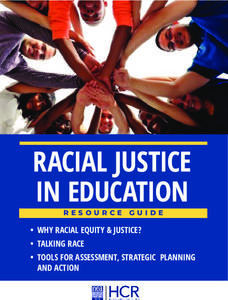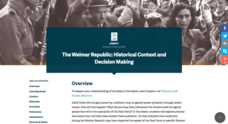Just Health Action
Equity Impact Review: Green Stormwater Infrastructure in Seattle
Using an Equity Impact Review (EIR) tool, developed by Washington state's King County to "identify, evaluate, and communicate issues of equity when making a decision," class members design a GSI program for two Seattle neighborhoods.
Just Health Action
Introduction to Stormwater Pollution and a Green Stormwater Infrastructure (GSI)
Sometimes when it rains, pollutants pour into sewers which overflow and contaminate the environment. The final two lessons in the Environmental Justice series looks at actions being taken to address stormwater pollution. Class members...
Just Health Action
How are Equality and Equity Different?
Equality does not equal equity. That's the take-away from a lesson that asks young people to consider what could be done to make a variety of situations more just, more equitable. After examining images that illustrate the difference...
Just Health Action
Environmental Justice Matters: Mapping Environmental Justice Impacts (Part 1)
A case study of Seattle, Washington permits class members to compare and rank how different areas of Seattle are impacted by environment burdens. Groups investigate different zip codes, collect data on five categories, and color-code a...
Just Health Action
Environmental Justice Matters: Mapping Cumulative Impacts (Part 2)
A case study enables class members to confirm whether different geographic parts of Seattle, Washington have disproportionate environmental burdens and benefits. Groups use the EPA's Cumulative Health Impact Analysis formula and...
Just Health Action
Causes of the Causes: What Are the Root Causes of This Problem?
A "Causes of the Causes" diagram enables class members to examine the contributing factors to a problem. After reading a poem that models the process, class members, either in gorps or individually, diagram an issues they are passionate...
Just Health Action
Whose Backyard? Toxic Waste Management Meeting and Environmental Injustice
Toxic waste is a global problem. What to do with environmental hazards and where to put toxic waste is a global concern. To better understand current issues around toxic waste management and how current practices can lead to...
National Education Association
Racial Justice in Education Resource Guide
Strive for racial justice within your classroom community with help from an 80-page resource guide. Five modules move scholars through thoughtful, and reflective grand conversations to making a plan, then taking action. Learners write...
Facing History and Ourselves
Speaking Up and Speaking Out
The final lesson in the Standing Up for Democracy unit offers class members a way they can stand up and speak out by crafting spoken word poetry, or Slam poetry. After analyzing several examples, individuals reflect on one positive...
Facing History and Ourselves
Protesting Discrimination in Bristol
Using the Bristol Bus Boycott as a case study, class members examine the strategies and levels of power protesters used to effect change. The two-day lesson concludes with individuals reflecting on the actions they might take in face of...
Facing History and Ourselves
Defining Our Obligations to Others
Introduce young learners to the concept of a Universe of Obligation, a term coined by sociologist Helen Fein, with a instructional activity that asks learners to consider the extent to which they feel a responsibility for others. Class...
Facing History and Ourselves
When Differences Matter
Jane Elliott's controversial blue eyes/brown eyes experiment detailed in the film A Class Divided leads to a discussion of privilege, social power, and opportunity. Viewers note how the children react to the experiment, share their...
Facing History and Ourselves
Responding to Difference
James Berry's poem, "What Do We Do With a Difference?" launches a lesson that asks class members to consider the ways people respond when they encounter someone different from themselves. After analyzing the poem and discussing how they...
Facing History and Ourselves
The Costs and Benefits of Belonging
Peer pressure and the desire for acceptance are powerful things. A thought-provoking lesson plan looks at the positive and negative effects of wanting to belong to a group. Class members examine the roles of the perpetrator, the victim,...
Teaching Tolerance
Using Photographs to Teach Social Justice | Showcasing Your Understanding
The final instructional activity in the series asks class members to demonstrate what they have learned about how photographs can revel injustice and how they can encourage people to take action against injustice. Either as a class, in...
Teaching Tolerance
Using Photographs to Teach Social Justice | Exposing Homelessness and Poverty
Photos can capture a complete story in a single image. Class members closely examine a photo of a homeless camp and attempt to read the story told by the picture. They then read the caption for the photograph and compare their notes with...
Teaching Tolerance
Using Photographs to Teach Social Justice | Exposing Anti-Immigration Sentiment
The debate about immigration reform continues. To gain a deeper understanding of the issues involved, class members first examine a photo of an anti-immigration rally. Groups then conduct an internet search for an image that presents an...
Teaching Tolerance
Using Photographs to Teach Social Justice | Exposing Racism
Photographs capture a moment in time. And some of the best pictures demand that viewers not only ask questions about why the photo packs such an emotional wallop, but also about what happened before and after it was taken. A photograph...
Facing History and Ourselves
Us and Them: Confronting Labels and Lies
Stereotyping and discrimination based on religion catalyze many atrocities in the world. Explain the awful treatment of Jews and the lies Nazis spread by using an informative yet sensitive resource. Learners participate in a warm-up and...
Museum of Tolerance
Improving My Community Through Social Action
Action is the heart of change. Encourage class members to not only identify critical social justice issues in their school or community but to take action as well. As individuals or as groups, they research a situation, develop a...
Museum of Tolerance
Creating an Ideal World
To conclude a study of social justice and tolerance designed to prepare classes for a visit to the Museum of Tolerance, class members brainstorm a safe and peaceful world. They then write about their own vision of this world.
Museum of Tolerance
And Justice for All? Slavery Not Just in the Past
Slavery in India, Sudan, and Mauritania? What about in the United States? Groups research modern slavery in these four countries, collecting factual evidence (What), determine their feelings about this evidence (So what), and consider...
Museum of Tolerance
The Pursuit of Democracy and Diversity: The Trial of Pro-Social Injustice in Historical Documents and Accounts
Class members investigate The Indian Removal Act of 1830, U.S. Theft of Mexican Territory Timeline, and President Abraham Lincoln’s letter to Horace Greeley, 1862, and then conduct a mock trial of each of these documents to determine...
Museum of Tolerance
Can It Happen in America?: Taking Social Action
Class members investigate the Jim Crow Laws, Executive Order 9066, the Chinese Exclusion Act, and the Indian Removal Act to gather information about not only the challenges encountered by diverse groups of Americans, but their...

























